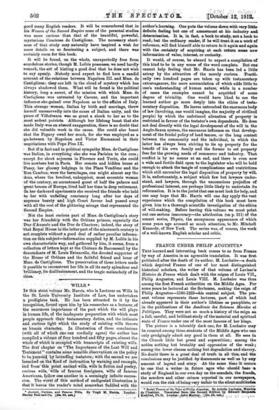- WILLS.* In this stout volume Mr. Harris, who is Lecturer
on Wills in the St. Louis University Institute of Law, has undertaken a prodigious, task. He has been attracted to it by the recognition, forced upon him by his researches as a lecturer, of the enormous importance of the part which the will plays in human life, of the inadequate preparation with which most people approach their testamentary duties, and the intimate and curious light which the study of existing wills throws en human character. In illustration of these conclusions (with all of which one can cordially agree) the author has compiled a Volutne a four hundred and fifty pages, almost the whole of which' is occupied with transcripts of existing wills. The first chapter on "'The Importance of the Last Will and Testament" contains some sensible.observations on the policy to be pursued by intending testators ; with the second we are launched on the 'flood of instruction by warning and example, and froni` this point, ancient wills, wills in fiction and poetry, curious wills,' wills of famous foreigners, wills of famous Americans, follow one another in a seemingly infinite succes- sion. The worst of this method of undigested illustration is that it leaves the reader's mind somewhat fuddled with the • Ancient, Curious, and POWWOW Wale. By Virgil 31, Harris. London-: Stanley Paul and Co. [lea. 64 sat.] author's.learning. One puts the volume-down with very' Hide definite, feeling -but one of amazement at his industry and determination. It is, in -fact, a book to study, not a book to read ; but the ordinary reader, if he will treat it as a wt rlr of reference, will find himself able to return to it again and again with the certainty of acquiring at each return some new information of mime, interest, or curiosity.
It would, of course, be absurd to expect a compilation of this kind to be in any sense of the word complete. But one cannot help feeling that Mr. Harris has been led a little astray by the attraction of the merely curious. Practi- cally two hundred pages are taken up with testamentary extravagances, the mere accumulation of which adds little to one's understanding of human nature; while in a number of cases the examples cannot be acquitted of some degree of triviality. One would have liked to 'see the learned author go more deeply into the ethics of testa- mentary disposition. He leaves untouched the enormous body of law (involving, one would imagine, the majority of civilized people) by which the unfettered alienation of property is" restrictedin favour of the testator's own dependents. He does not deal directly with the legal development of the will in the Anglo-Saxon system, the enormous influence on that develop- ment of the feudal policy of land tenure, or the long contest between the community and the individual, in which the latter has always been striving to tie up property for the benefit of his own family and the former to set property free for the growing needs of commerce and industry. That conflict is by no means at an end, and there is even now a wide and fertile field open to the legislator who will be bold enough to attack the tangle of complications and restrictions which still encumber the legal disposition of property by will. It is, unfortunately, a subject which few but lawyers under- stand, and lawyers, through the unconscious prejudice of professional interest, are perhaps little likely to undertake its reformation. It is to the jurist that one must look for help, and one may hope that Mr. Harris will one day apply the -vast experience which the compilation of this book must have given him to a thorough scientific investigation of the ethics of will-making. Before leaving this volume we must point out one serious inaccuracy—the attribution (on p. 211) of the sonnet series, Thysia, the anonymous appearance of which some years ago aroused so much attention, to Mr. Mitchell Kennedy, of New York. The series was, of course, the work of a well-known English scholar and critic.










































 Previous page
Previous page